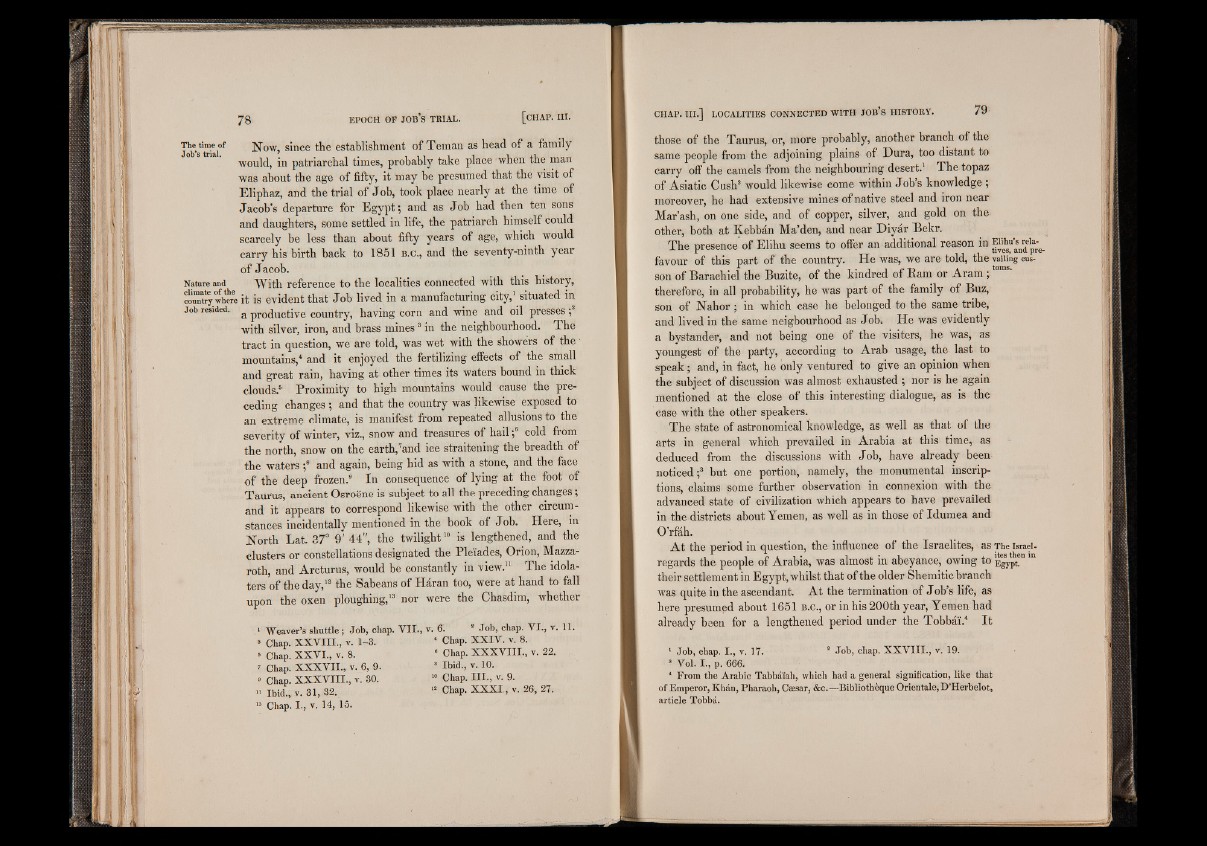
The time of Now, since the establishment of Teman as head of a family
would, in patriarchal times, probably take place1 when the man
was about the age of fifty, it may be presumed that the visit of
Eliphaz, and the trial of Job, took place nearly at the time of
Jacob’s departure for Egypt; and as Job had then ten sons
and daughters, some settled in life, the patriarch himself could
scarcely be less than about fifty years of age, which would
carry his birth back to 1851 B.C., and the seventy-ninth year
of Jacob.
Nature and Wdth reference to the localities connected with this history,
country where it is evident that Job lived in a manufacturing city,1 situated in
job resided. a pr0(juctive country, having corn and wine and oil presses f
with silver, iron, and brass mines3 in the neighbourhood. The
tract in question, we are told, was wet with the Showers of the'
mountains,4 and it enjoyed the fertilizing effects of the small
and great rain, having at other times its waters bound in thick
clouds.5 Proximity to high mountains would cause the preceding
changes ; and that the country was likewise exposed to
an extreme climate, is manifest from repeated allusions to the
severity of winter, viz., snow and treasures of hail ;6 cold from
the north, snow on the earth,'’and ice straitening the breadth of
the waters f and again, being hid as with a stone, and the face
of the deep frozen.9 In consequence of lying at the foot of
Taurus, ancient Osroene is subject to all the preceding changes;
and it appears to correspond likewise with the other circumstances
incidentally mentioned in the book of Job. Here, in
North Lat. 37° 9' 44", the twilight10 is lengthened, and the
clusters or constellations designated the Pleiades* Orion, Mazza-
roth, and Arcturus, would be constantly in view.11 The idolaters
of the day,12 the Sabeans of Haran too, were at hand to fall
upon the oxen ploughing,13 nor were the Chasdim, whether
I Weaver’s sh u ttle ; Job, chap. V I I ., v. 6. 9 Job, chap. V I., v. 11.
8 Chap. X X V I I I ., v. 1-3. 4 Chap. X X IV . v. 8.
s Chap. X X V I., v. 8. 8 Chap. X X X V I I I ., v. 22.
| Chap. X X X V I I ., v. 6, 9. 8 Ibid., v. 10.
8 Chap. X X X V I I I ., v. 30. 10 Chap. I I I . , v. 9.
II Ibid., v. 31, 32, 19 Chap. X X X I,, v. 26, 27.
13 Chap. I ., v. 14, 15.
those of the Taurus, or, more probably, another branch of the
same people from the adjoining plains of Dura, too distant to
carry oft’ the camels from the neighbouring desert.1 The topaz
of Asiatic Cush3 would likewise come within Job’s knowledge ;
moreover, he had extensive mines of native steel and iron near
Mar’ash, on one side, and of copper, silver, and gold on the
other, both at Kebbán Ma’den, and near Diyár Bekr.
The presence of Elihu seems to offer an additional reason in ®1ehs[’5nrdelpar"e.
favour of this part of the country. He was, we are told, the vailing cus-
son of Barachiel the Buzite, of the kindred of Bam or Aram ;
therefore, in all probability, he was part of the family of Buz,
son of Nahor ; in which case he belonged to the same tribe,
and lived in the same neigbourhood as J ob. He was evidently
a bystander, and not being one of the visiters, he was, as
youngest of the party, according to Arab usage, the last to
speak ; and, in fact, he only ventured to give an opinion when
the subject of discussion was almost exhausted ; nor is he again
mentioned at the close of this interesting dialogue, as is the
case with the other speakers.
The state of astronomical knowledge, as well as that of the
arts in general which prevailed in Arabia at this time, as
deduced from the discussions with Job, have already been
noticed;3 but one portion, namely, the monumental inscriptions,
claims some further observation in connexion with the
advanced state of civilization which appears to have prevailed
in the districts about Yemen, as well as in those of Idumea and
O’rfáh.
At the period in question, the influence of the Israelites, as The Israel,
regards the people of Arabia, was almost in abeyance, owing to Egypt?
their settlement in Egypt, whilst that of the older Shemitic branch
was quite in the ascendant. At the termination of Job’s life, as
here presumed about 1651 b .c ., or in his 200th year, Yemen had
already been for a lengthened period under the Tobbai.4 It
1 Job, chap. I ., v. 17. ! Job, chap. X X V I I I ., v. 19.
8 Vol. I ., p. 666.
* From the Arabic Tabbaiah, which had a general signification, like that
of Emperor, Khan, Pharaoh, Cæsar, &c.—Bibliothèque Orientale, D ’Herbelot,
article Tobbá.